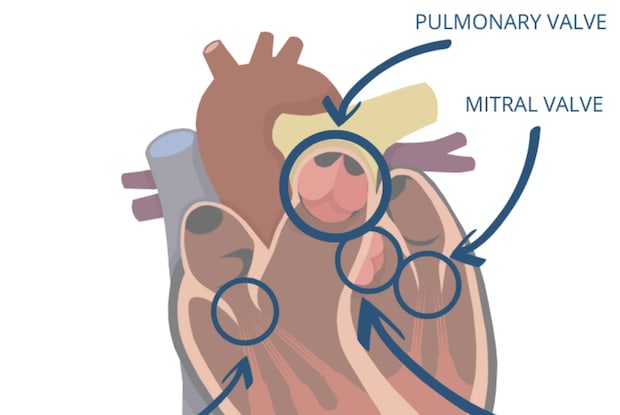Table of Contents
II. What are artificial heart valves?
III. Why You Shouldn't Take Eliquis with an Artificial Heart Valve
IV. Warfarin, an Alternative to Eliquis
V. Talk to a licensed pharmacist at RxConnected.
Artificial heart valves may be necessary for patients whose natural heart valves no longer work as well as they should. After surgery, these patients are at increased risk of dangerous blood clots. [1] Blood clots can result in stroke or pulmonary embolism.
To prevent this, many doctors prescribe a type of medication called an anticoagulant (“blood thinner”) to patients. These drugs prevent blood from clotting too easily and creating clots that can be problematic or life-threatening at times. A common anticoagulant in this family of drugs is Eliquis (generic name: apixaban).
Eliquis is now available in generic form through an online Canadian pharmacy. RxConnected sources its medications from countries where generic Eliquis is already available, so Americans can now have access to this traditionally expensive drug.
But you may have heard that Eliquis and artificial heart valves don’t go well together. Let’s take a deeper look at the problems involved and what you can do if you have an artificial heart valve but need an anticoagulant.
Save Up To 80% Off Brand & Generic Eliquis (Apixaban) at RxConnected Experience unparalleled savings on both generic and brand-name Eliquis when you shop at RxConnected. As a certified Canadian online pharmacy, we are committed to delivering top-quality medication right to your doorstep. With hundreds of glowing reviews, our satisfied customers are a testament to our exceptional service and unbeatable prices.
What are heart valves?
First, we need to understand how heart valves work. [2]
The human heart has four valves. These valves open and close to control the flow of blood in and out of the heart. They ensure blood flows in the right direction and they prevent backflow. The four valves are:
- Tricuspid — controls blood flow between the right atrium and right ventricle
- Mitral — controls blood flow between the left atrium and left ventricle
- Aortic — controls blood flow from the left ventricle to the aorta, which supplies oxygen-rich blood to the body
- Pulmonary — controls blood flow from the right ventricle to the pulmonary artery, which delivers blood to the lungs to be oxygenated
Get savings updates for Eliquis
Here is a diagram of each valve’s location in the heart.

An artificial heart valve may be required if a patient’s natural heart valves don’t work properly, each causing slight variations in how the blood flows through the heart. Three such conditions where this happens are stenosis, regurgitation, prolapse, and atresia.
Stenosis
Stenosis is when a valve is too stiff, fused together, or too thick to work properly. The affected valve doesn’t open fully, which means not enough blood flows through.
Regurgitation
Regurgitation is when a valve doesn’t close properly, causing blood to “leak” backward (regurgitation).
Prolapse
This is when the valve flaps in the heart “bulge back” into an upper heart chamber (atrium) during a heartbeat. It usually affects the mitral valve.
Atresia
Atresia is when the heart valve lacks a suitable opening for blood to go through.
Heart valve disorders may be a complication of another condition; for example:
- Infections, such as the rare infective endocartis
- Congenital disorders — disorders you are born with
- Advanced hypertension and heart failure
- Artherosclerosis (build-up of waxy substances called plaque) in the aorta
- Rheumatic fever, caused by an infection that wasn’t treated properly
- Blunt trauma to the chest, such as a car wreck

What are artificial heart valves?
Medications can treat heart valve disorders, but if the condition is serious, the patient may need surgery to repair or replace their heart valves. Replacement valves can be biological (from humans, cows, or pigs), man-made, or a mix of both.
Artificial man-made heart valves last longer and don’t need to be replaced, but patients are required to take blood thinners for the rest of their life. This is because a patient’s risk of having a stroke due to a blood clot becomes high after surgery.
One of the most popular blood thinners used today is warfarin. While it has been used for decades and is well-studied, warfarin requires patients to have regular blood tests. So it can become a very inconvenient regimen for many. [3] Newer blood thinners include Xarelto and Eliquis do not require regular blood testing.

Why You Shouldn't Take Eliquis with an Artificial Heart Valve
So why shouldn’t patients with artificial heart valves take Eliquis to minimize blood clots?
The answer is complex, but simply put, scientists simply don’t know how safe Eliquis is for patients with artificial heart valves.
For example, a drug belonging to the same family as Eliquis, dabigatran, was tested to see how it compares with warfarin. [4] Scientists were forced to halt the trial early because too many patients suffered adverse bleeding effects as a result of the dabigatran. This has made medical professionals extra wary. As one physician puts it, “the drug companies that make the other NOACs [the drug family dabigatran and Eliquis belong to] have been nervous about testing their drug in people with mechanical valves." [5]
Eliquis’ official statement is that apixaban is not for people with heart valve problems. They make this very clear in their marketing material and website.
But this study was conducted in 2013. In 2017, scientists once again compared newer anticoagulants with older ones. [6] This time, they compared apixaban (Eliquis!) and warfarin in a-fib patients with a history of bioprosthetic valve replacement or valve repair. This study found that apixaban may be a viable treatment choice for this demographic of patients, though larger trials must be conducted to confirm this.

Warfarin, an Alternative to Eliquis
As an alternative to Eliquis, patients at risk of a dangerous blood clot may be prescribed warfarin instead.
While it has a long history of use, warfarin treatment must be monitored carefully so that the blood is not completely prevented from clotting. [7] This means patients may need to undergo regular blood tests, and dosages may change throughout treatment. However, it is also easier to reverse in urgent or emergent clinical settings.
Patients may also need to monitor their diet. [8] Some foods can impact the effectiveness of warfarin. Eating foods that are too rich in vitamin K — such as broccoli and spinach — can interfere with warfarin. However, do not make any drastic changes in your diet without first talking to your doctor.
Talk to a licensed pharmacist at RxConnected.
If you have a heart valve condition, you should first contact your doctor and have a discussion about your treatment options. Your doctor will prescribe the best medication suited for your unique needs.
If you have questions about your medication, including how you can afford it, contact us! We can provide all our customers with access to a British Columbia-licensed pharmacist.
DISCLAIMER: The content in this article is intended for informational purposes only. This website does not provide medical advice. In all circumstances, you should always seek the advice of your physician and/or other qualified health professionals(s) for drug, medical condition, or treatment advice. The content provided on this website is not a substitute for professional medical advice, diagnosis or treatment.

